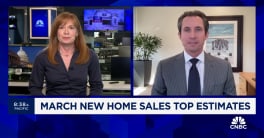The subprime mortgage industry may be going through hard times but the paper industry and those who invest in broadband capacity are probably laughing all the way to the bank.
There must have been billions of words of explanation, excuses, suggestions, demands, and sheer propaganda spoken and written over the last several months and especially the last few weeks about the subprime market and its problems which are variously described by the speakers and writers as a crisis, a minor blip, a pending catastrophe, or a small price to pay for half a decade of skyrocketing home ownership.
And the latter theory has ignited a firestorm of its own in the last few days
as the Mortgage Bankers Association, mortgage lenders, and even the Federal
Reserve have made comments about the net increase in home ownership while consumer
organizations and advocates have railed that it just isn't true.
Other skirmishes have erupted over who should be regulating
the subprime market or making decisions about underwriting guidelines and the
wisdom of regulation at all.
Hard to know where to begin.
But Congress has been holding multiple hearings on the crisis, blip, or whatever it is and some interesting points have been made. Herein a sampling of a few things that have been said.
Senator Christopher Dodd, (D-CT) held a hearing of the Senate Committee on Banking, Housing, and Urban Affairs where testimony was heard from witnesses representing federal banking regulators (Federal Deposit Insurance Corporation, Office of Thrift Supervision, etc.,) state regulators, lenders, consumer advocates, and individual consumers.
The Senator expressed his determination to introduce legislation to attack the problem of predatory lending and finally to deal with the millions of homeowners who may ultimately face foreclosure. Dodd said that the solution to the latter may not be legislative; that regulators, investors, GSE's and consumer advocates should come together to work out efficient procedures for providing relief to homeowners. "One thing I know for sure - we cannot simply sit back and watch as up to 2.2 million families lose their homes and, with them, their financial futures."
The Senator has elsewhere talked about legislation that would perhaps mandate longer timelines for the foreclosure process.
Sandy Samuels, representing Countrywide Financial Corporation, presented some interesting statistics about Countrywide's huge share of the subprime market:
Historically 80 percent of subprime borrowers, he said, refinance within 36 months of taking their loan and this number is approximately the same as for prime rate borrowers. Of those subprime borrowers who refinanced with Countrywide, half were able to transition (upon refinancing) into prime mortgage products and another 25 percent were able to secure fixed-rate, albeit still subprime products. During the term of their original financing, these borrowers moved their credit scores upwards about 50 points and obtained often significantly lower interest rates as a result.
During the recent period Countrywide has seen an increasing reliance on hybrid ARMS used for home purchases; in the fourth quarter of last year nearly half of subprime hybrid loans were for purchases and 70 percent of those went to first time buyers.
Samuels said in his company's experience the subprime hybrids are a valuable tool and that, over the last 10 years Countrywide had originated over $100 billion in such loans with only 3.4 percent resulting in foreclosure. The worst year was 2000 during which the foreclosure rate was 9.89 percent and the company expects that 2006 originations might again approach that level but "we cannot lose sight of the reality that more than 90 percent of Countrywide's subprime borrowers will not lose their homes... and will have had the opportunity to enjoy the benefits of homeownership."
On the House side, the Subcommittee on Financial Institutions and Consumer Credit held a hearing on March 27. Panelists again included the usual suspects, regulators, consumer advocacy groups and representatives of the National Association of Mortgage Brokers and the Mortgage Bankers Association. The one surprise panelist was a representative from the conservative think-tank American Enterprise Institute who, in the midst of a sort of blame the victim presentation suggested that loan originators should maintain a vested interest in the loans they write. In other words, the mortgage company or broker should not be allowed to write a loan of significant risk and then transfer all of that risk to an investor.All of this testimony is ultimately predictable although new figures and unique ideas do come through. Overall it is filtered through special interests, self protection, and corporate/government/policy agendas. The same is true of the two significant controversies referenced above that have emerged from all of this writing and speechifying. The first is another round in the debate between the Conference of State Banking Regulators and the National Association of Mortgage Brokers centering on CSBR's new national registry. The second is what appears to be an escalating (and ultimately probably futile empty barn/open door) argument between the mortgage lending industry (with a few regulators on their side) and consumer advocates over whether the relaxed lending guidelines over the last few years really contributed to a net gain in homeownership. We will examine these debates and a recent editorial in The Nation regarding the role of campaign contributions in this mess.







